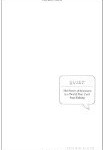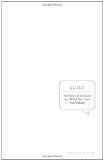Five words from the blurb: introvert, extrovert, divide, theory, society
Quiet is a book that analyses the way introverts are treated in America. It aims to raise the self confidence of quiet people and prove that they have a vital role in society.
In the book Susan Cain, a self-proclaimed introvert, explains how she conquered her fear of public speaking and embraced her quiet thoughtfulness to become a successful lawyer. The book combines her personal journey of self discovery with scientific research, but it was all easy to read and never got too technical.
But introverts seem to think more carefully than extroverts, as the psychologist Gerald Matthews describes in his work. Extroverts are more likely to take a quick-and-dirty approach to problem-solving, trading accuracy for speed, making increasing numbers of mistakes as they go, and abandoning ship altogether when the problem seems too difficult or frustrating. Introverts think before they act, digest information thoroughly, stay on task for longer, give up less easily, and work more accurately.
America is a more extrovert nation than the UK (apparently this is because many of the British extroverts had the confidence to leave and start new lives overseas) and so I didn’t recognise many of the scenarios mentioned. I think the problems faced by those in the UK are far more subtle and so although it was interesting (and scary!) to learn about the competitive socialising of the Harvard Business School it was leagues away from anything I’ve experienced.
There were some good sections about differences in the work place and the book contained enough little snippets of interesting information to keep me reading to the end, but I finished it having learnt nothing particularly ground breaking. There were also times when it veered away from the scientific focus that I love and became a bit of a fluffy self-help book.
After reading the book I was a little confused as to whether or not I’m an introvert as I share traits from both ends of the spectrum. I took the Guardian introvert test and discovered I’m an ambivert – I didn’t even know the term existed! Perhaps the extrovert half of me contributed to my lack of passion for this book?
Overall, this is a comprehensive study of introverts in America, but will probably be of limited use to those outside the US.

.
The thoughts of other bloggers:
Quiet is a worthwhile read for both introverts and extroverts – so the former can feel much more at home in their own skin and so extroverts can learn more about life on the other side of the divide. Medieval Bookworm
Even though there were dry parts, I still think this is a book worth reading. Chrisbookarama
I found the subject matter of Quiet, and the way in which the author presented it to be utterly fascinating. Bibliophile by the Sea


20 replies on “Quiet by Susan Cain”
Interesting, I’ve seen reviews of this on other blogs and wondered how US oriented it is. I took the Guardian test – I have a tendency towards being introvert, with a score of 13 out of 20, so not far from being ambivert. I didn’t know there was such a thing either. I think I’m an introvert at heart.
Margaret, I prefer reading to watching TV, but I’d rather be out at a party than in the house reading. I scored 10/20 and am a very bizarre mixture of both types – don’t think I’ve met anyone else like me 🙂
Being an extrovert myself, it hurts to see my daughter struggle with being an extreme introvert. I don’t even know how to help her get past some of these obstacles…for me it was always so easy to meet people and make friends. I know she will figure it out, but it is hard for the quiet ones to be a success when so much more is expected of them (even at this age).
Sandy, I’m sure that with your help and support your daughter will be fine – it is the parents who don’t understand how hard it can be that make life difficult for the child. Best of luck.
We’ve covered a bit on this at work in Insights training. I have a feeling that probably went more in depth than this book as that sort of takes into account people being a mix of things.
Ellie, Yes, I’ve had training at work that was a bit more complex – with 4 personality types and everyone plotted on a x/y axis. That probably went into a similar depth and may explain why this was nothing new to me.
I would guess I’m a bit of an ambivert too, so I’m also glad to know it has a name. I particularly enjoyed your thoughts on the distinctions in introvertedness in the UK v. the US. I read an interview with this author, which I really enjoyed, but I wasn’t compelled to explore this issue in an entire book.
nomadreader, I bet the author makes a very good public speaker and I’d be very interested to hear her talk at an event. I’m sure she could cover the basic points of this book in a short time.
Good to read your experiences with this book. I saw it on other blogs and liked the idea of it. But since I’m not in the USA either, it’s probably not a book for me, either.
Off to take the test now…
Judith, I saw all the positive US blog coverage before this book was released in the UK. I didn’t stop to think that it might be country specific, but will be more cautious about that sort of thing now.
It’s interesting to hear your thoughts on this one, having read other reviews before. I can see where there would be issues for a British reader, from what you’ve said, yet it’s surprising nonetheless to hear it. Not sure I’d agree with the theory of the settlers being extroverts and that being the reason for situations today, surely it’s a bit too far back to be so relevant.
Charlie, apparently there is a strong genetic link with introversion and so when a large number of extroverts left the Uk that left a large population of introverts to breed and produce introverted children. The opposite happened in America. It may have happened a long time ago, but that doesn’t mean it can’t still have an impact. I`d never thought of it like that before, but it makes sense now i think about it.
I’m really interested in this book and scored a whopping 17 on the introvert scale! I think I might scupper some of her theories though as I’ve left the UK to live overseas (twice) and am reasonably confident and assertive. I do think it’s an extrovert’s world out there though – especially in the workplace. And I notice in schools there is a lot of emphasis on kids mixing well and joining in – my 8 year old is much happier in his own company and gets stressed out at parties and playing sport whereas my 5 year old extrovert gets on fine. Good to see someone putting the introvert’s case forward though.
Liz, I don’t think it is uncommon for introverts to leave the UK now, but it must have taken a lot more confidence to risk everything and begin a new life in an unknown place a few hundred years ago.
I agree it is nice to see someone singing the praises of introverts – they have acheived an amazing number of things!
I can see how this book could tend towards being more specific to the US, since it is not only how introverted you are, but how that works within your culture/society. Fascinating to think about US immigrants/founders being basically extroverted!
I’m definitely an introvert (actually scored 20 of 20 on that quiz! crazy, huh?) but I’m no longer shy, and I don’t get anxious about any of it, which makes a big difference. There were a lot of the questions on the quiz that surprised me, as I didn’t think they were necessarily related to being an introvert at first, like preferring to express myself in writing, or letting calls go to voicemail.
I have this book (Quiet) on my end table, but I haven’t read it yet. Looking forward to it, but expecting some filler at the same time.
Melody, 20/20? Wow! It is lovely to hear that someone scoring 20/20 isn’t shy and is quite comfortable with their traits.I hope that you enjoy the book and you manage to learn a bit more about yourself from it.
Really interesting post. I’ve always been an extrovert and all my three boys are, to the extreme I should say. Africans and for that matter Ghanaians, are a fun loving happy-go-lucky type. (generally) and we have no option but to be so, as a means of finding an outlet for all that worry and stress prevalent in developing countries.
Reading Pleasure, It is interesting to learn that Ghana is a nation of extraverts too. I’d love to see some study as to why certain nations contain more of one personality type than another and whether this is likely to change over time.
I’m curious about this book but keep forgetting to put it on my list. Thanks for the reminder.
Interesting. I’d only seen 100% positive reviews before, but I think they were all written by Americans so maybe that’s as important as you say. Like you, I’m an ambivert, but I do get irritated at being pushed to show my outgoing side and deny my shy side.